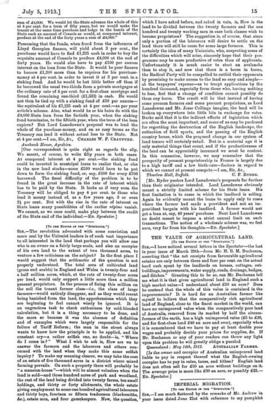[To THE EDITOR OF TILE "SpEcTaroit."1
Sin,—The revolution advocated with some conviction and more zeal by the Unionist leaders is of such vast importance to all interested in the laud that perhaps you will allow one who is an owner on a fairly large scale, and also an occupier of his own land to the extent of two thousand acres, to venture a few criticisms on the subject? In the first place I would suggest that the arithmetic of the question is not properly understood. The total area of cultivated land (gross and arable) in England and Wales is twenty-four and a half million acres, which, at the rate of twenty-four acres per head, would only support a little more than a million peasant proprietors. In the process of fixing this million on the soil the tenant farmer class—i.e., the class of large farmers—would entirely disappear, and as they would resent being banished from the land, the apprehensions which they are beginning to feel cannot wisely be ignored. It is an ungracious task to check enthusiasm by cold-blooded calculation, but it is a thing necessary to be done, and the more so because it was the absence of definition and of examples which were largely responsible for the failure of Tariff Reform; the man in the street always wants to know how the principle is to be applied, and his constant cry—a rather selfish one, no doubt—is, " Where do I come in F" What I wish to ask is, How are we to answer the farmers and the labourers and others con- cerned with the land when they make this same selfish inquiry P To make my meaning clearer, we may take the case of an estate of five thousand acres in a district where mixed farming prevails. On such a property there will probably be " a mansion-house "—which will be almost valueless when the land is sold—and three hundred acres of park and woodland, the rest of the land being divided into twenty farms, ten small holdings, and thirty or forty allotments, the whole estate giving employment to some one hundred agricultural labourers and thirty boys, fourteen or fifteen tradesmen (blacksmiths, &c.), estate men, and four gamekeepers. Now, the question, which I have asked before, and asked in vain, is, How is the land to be divided between the twenty farmers and the one hundred and twenty working men in case both classes wish to become proprietors? The suggestion is, of course, that since only a portion of the labourers will desire to settle on the land there will still be room for some large farmers. This is certainly the idea of many Unionists, who, suspecting some of the difficulties which will arise, sincerely hope that their pro- gramme may be more productive of votes than of applicants. Unfortunately it is much easier to start an avalanche than to stop it, and now that there is a boom in boons, the Radical Party will be compelled to outbid their opponents by promising to make access to the land so easy and simple— at the taxpayers' expense—as to tempt applications by the hundred thousand, especially from those who, having nothing to lose, feel that a change of condition cannot possibly do them any harm. The result will be that instead of having some yeoman farmers and some peasant proprietors, as Lord Lansdowne and Mr. Jesse Collings imagine, the land will La broken up everywhere into little bits in exchange for votes. Burke said that it is the indirect effects of legislation which are often the most important, and some of us may be pardoned for regretting the destruction of the English landscape, the extinction of field sports, and the passing of the English country house, which the proposed change in our system of land tenure will certainly entail. But in a material age it is only material things that count, and if the productiveness of the land can be appreciably increased we must be content. In this connexion, however, we may remember that the prosperity of peasant proprietorship in France is largely due to a high tariff and a low birth-rate—factors in regard to which we cannot at present compete.—I am, Sir, &c., [Mr. Ryder pushes Lord Lansdowne's proposals far further than their originator intended. Lord Lansdowne obviously meant a strictly limited scheme for his State loans. His first limitation is 'to cases in which the landlord is selling. Again he evidently meant the loans to apply only to cases where the farmer had made a provident and not an im- provident bargain with his landlord. A farmer would not get a loan at, say, 40 years' purchase. Next Lord Lansdowne no doubt meant to impose a strict annual limit on such transactions. The notion of a wholesale scheme was, we feel sure, very far from his thoughts.—ED. Spectator.]


















































 Previous page
Previous page